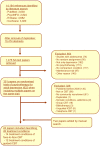Adherence to Internet-based and face-to-face cognitive behavioural therapy for depression: a meta-analysis
- PMID: 25029507
- PMCID: PMC4100736
- DOI: 10.1371/journal.pone.0100674
Adherence to Internet-based and face-to-face cognitive behavioural therapy for depression: a meta-analysis
Abstract
Background: Internet-based cognitive behavioural therapy (iCBT) is an effective and acceptable treatment for depression, especially when it includes guidance, but its treatment adherence has not yet been systematically studied. We conducted a meta-analysis, comparing the adherence to guided iCBT with the adherence to individual face-to-face CBT.
Methods: Studies were selected from a database of trials that investigate treatment for adult depression (see www.evidencebasedpsychotherapies.org), updated to January 2013. We identified 24 studies describing 26 treatment conditions (14 face-to-face CBT, 12 guided iCBT), by means of these inclusion criteria: targeting depressed adults, no comorbid somatic disorder or substance abuse, community recruitment, published in the year 2000 or later. The main outcome measure was the percentage of completed sessions. We also coded the percentage of treatment completers (separately coding for 100% or at least 80% of treatment completed).
Results: We did not find studies that compared guided iCBT and face-to-face CBT in a single trial that met our inclusion criteria. Face-to-face CBT treatments ranged from 12 to 28 sessions, guided iCBT interventions consisted of 5 to 9 sessions. Participants in face-to-face CBT completed on average 83.9% of their treatment, which did not differ significantly from participants in guided iCBT (80.8%, P = .59). The percentage of completers (total intervention) was significantly higher in face-to-face CBT (84.7%) than in guided iCBT (65.1%, P < .001), as was the percentage of completers of 80% or more of the intervention (face-to-face CBT: 85.2%, guided iCBT: 67.5%, P = .003). Non-completers of face-to-face CBT completed on average 24.5% of their treatment, while non-completers of guided iCBT completed on average 42.1% of their treatment.
Conclusion: We did not find studies that compared guided iCBT and face-to-face CBT in a single trial. Adherence to guided iCBT appears to be adequate and could be equal to adherence to face-to-face CBT.
Conflict of interest statement
Figures




References
-
- Andersson G, Cuijpers P (2010) Internet-based and other computerized psychological treatments for adult depression: a meta-analysis. Cogn Behav Ther 38: 196–205. - PubMed
-
- Richards D, Richardson T (2012) Computer-based psychological treatments for depression: a systematic review and meta-analysis. Clin Psychol Rev 32: 329–342. - PubMed
-
- Christensen H, Griffiths KM, Mackinnon AJ, Brittliffe K (2006) Online randomized controlled trial of brief and full cognitive behaviour therapy for depression. Psychol Med 36: 1737–1746. - PubMed
Publication types
MeSH terms
LinkOut - more resources
Full Text Sources
Other Literature Sources
Medical
Miscellaneous

